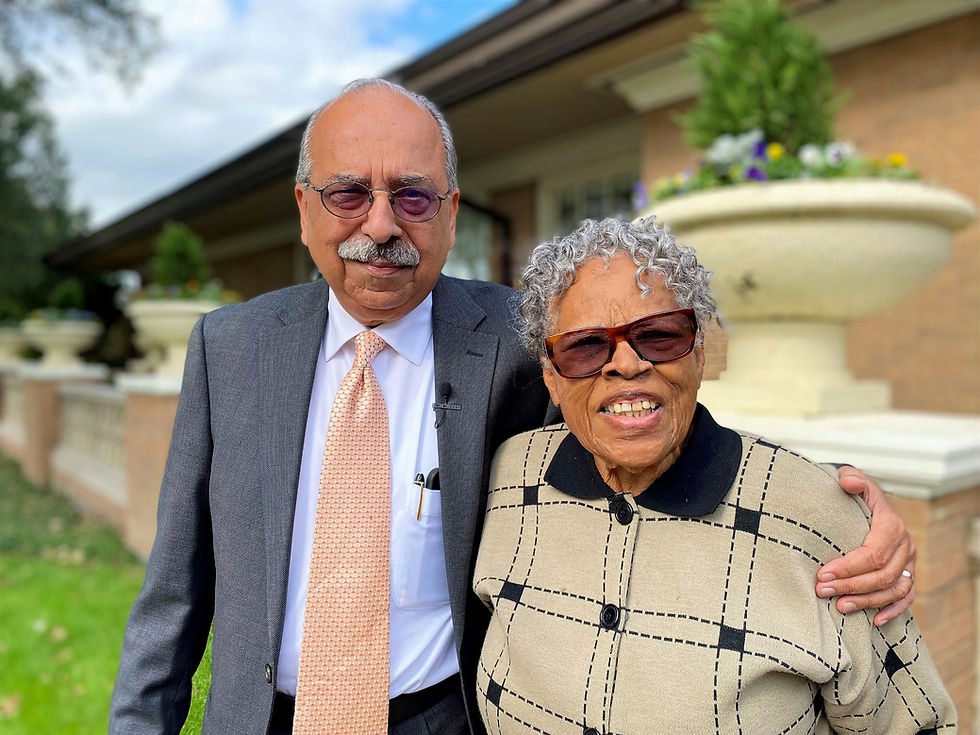Juneteenth, Nobel bring together hearts and minds of leaders who care
- Cactusflower

- Nov 19, 2021
- 4 min read
Updated: Sep 10, 2022

Circumstances of birth and events that we experience as children often have a profound impact on the quality and focus of our lives. Some people, born into wealth and privilege, ease through a lifetime of the same. Some, born into poverty, struggle throughout life and cannot escape the sad circumstances of their birth. Others live a Horatio Alger existence, reaching the middle class through hard work and a little luck.
But every now and then, you run across those who not only manage to transform their own lives but become transformational themselves. They find a way to change society, in ways large or small, and become an inspiration to others.
On Nov. 10, two such charismatic people met in Irving, Texas, for the first time, exchanging life stories and ideas for future plans.

Ms. Opal Lee—teacher, longtime civil rights leader, social impact activist, the “Grandmother of Juneteenth,”— and Mr. Raveen Arora—refugee, entrepreneur, global humanitarian, and 2021 Nobel Peace Prize nominee—sat down together for something as ordinary as lunch and a chat.
Just like ordinary people, as Arora has described the two of them.
But they have not been ordinary for a long time and will never be again.
Opal Lee stopped being “ordinary” forever on the day in September 2016 when, at the age of 89, she started her symbolic walk from Fort Worth to Washington DC on a campaign to make Juneteenth a federal holiday.
Arora stopped being “ordinary” forever on Jan. 31, 2021, which was the deadline for his supporters to submit his name and accomplishments for a Nobel Peace Prize.
Before those dates, their lives still were not conventional or ordinary. If fact, they had some surprising similarities.
Born about 8500 miles and two decades apart, Lee and Arora both experienced as children the ugly face of racism. Like many racist incidents, the worst in Opal Lee’s case was also violent.
In June 1939, her family bought a home in a predominantly white area of Fort Worth. On June 19th, which had always been a day to picnic in celebration of freedom from slavery, 500 white rioters vandalized and burned down her home. Lee was 12 years old at the time that this hate crime was carried out against her family.

On the other side of the world, Arora, who was born in a refugee camp in India in 1948 after his family fled the war-torn Punjab region, was an unwilling witness and target of the institutional racism left over from the British colonial rule of India. It could be very stark and painful for a child. It literally kept Indians out of certain places, as well as out of opportunities.
“I was present when my grandfather was forbidden to enter a “whites only” cricket club because ‘Indians and dogs were not allowed,’ as it was explained to us,” Arora recalled.
“Our circumstances sooner or later become our stories,” Arora has often said. “My circumstances and Opal Lee’s drove us towards a certain life and certain outcome. Without these triggers, our lives might have been quite different.”

These events only strengthened the resolve of Lee and Arora and their families to do everything in their power to bring about change.
In both cases, they believed in education as one of the answers.

Arora, raised in poverty near the slums of Kolkata, was educated by the Jesuits in one of the best schools in the city, St. Xavier College. This led to his meeting with Mother Teresa, who became his mentor and teacher as he was growing up, teaching him compassion, humility, dignity, and respect. Later, he met Dr. Martin Luther King, Jr., with whom he discussed the inequality that he had experience in India, which had triggered his passion for helping others. After about twenty years in the Tempe, Arizona, area, where he was recognized repeatedly for his humanitarian efforts there and throughout the world, he moved to the north Texas area to be near his daughter and grandchildren.
Lee, reacting to the experience of the hate crime committed against her family, turned her life towards teaching, community involvement, and activism. She engaged in the Fort Worth-Tarrant County Community Action Agency board, Evans Avenue Business Association board, Tarrant County Habitat for Humanity, and Citizens Concerned with Human Dignity. She currently serves on the Unity Unlimited, Inc. Board, a non-profit organization whose main mission is providing educational activities and resources to people, young and old, to foster unity and harmony within the community, the city, the state, the nation, and the world regardless of race, culture, or denomination.

In 2016, at the age of 89, she decided to walk from her home in Fort Worth to Washington, DC, in a campaign to get Juneteenth named a federal holiday. She traveled two and a half miles each day to symbolize the two and a half years that Black Texans waited between the issuance of the Emancipation Proclamation, on Jan. 1, 1863, and the day that message arrived in Galveston, on June 19, 1865.
The rest is history, as Congress has passed, and the President has signed legislation to make June 19th a federal holiday. Lee was 94 years old on that occasion.

“Our similarities lie in our beliefs about equality, diversity, opportunity,” Arora said. “We are in fundamental agreement on these principles.
Opal Lee agreed. “We are two very ordinary people from humble beginnings, showing the world our humanity. If we can do these things, what can stop the young people? Remember, none of us are free until we are all free.”
Perhaps another way of saying, "we are all just walking each other home."















































Comments